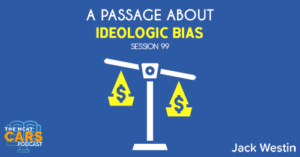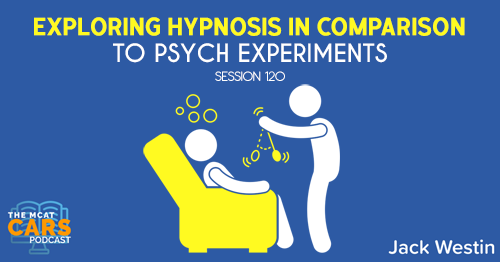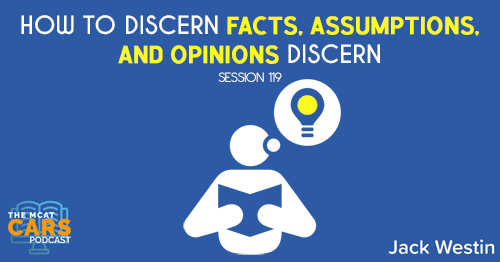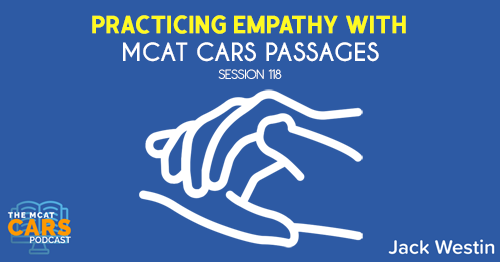Apple Podcasts | Google Podcasts
Session 99
Today, we unfold a passage about ideological corruption and contemporary science. Be careful not to let your expectation be your perception of it.
As always, I’m joined by Jack Westin from JackWestin.com. Check out all their amazing free resources including a free trial session of Jack’s full course to see how it’s like learning from Jack Westin himself.
Listen to this podcast episode with the player above, or keep reading for the highlights and takeaway points.
Link to the article:
https://www.scientificamerican.com/article/awareness-of-our-biases-is-essential-to-good-science
In a recent op-ed in the Wall Street Journal, Lawrence Krauss bemoans what he sees as contemporary science’s “ideological corruption.” He blames this corruption on humanities scholars for pointing out how science can be “tainted by ideological biases due to race, sex or economic dominance.” His complaint rests on a basic mistake. Krauss confuses what he calls ideological corruption—ideology leading science astray from facts—with ideological awareness.
Ideological commitments and social and political values have always influenced scientific research. Such values can light the way for science or lead into darkness. For most of the history of medical research, studies have disproportionately focused on men. As a result, we know far less about how various ailments manifest in women, and how to treat those ailments with appropriate drugs at appropriate dosages.
This is a problematic influence of values; one that has had deadly outcomes. Currently, a tremendous amount of scientific research has pivoted to address different facets of COVID-19; this is a laudable shift that reflects our collective priority of managing and ultimately ending this pandemic. Science does not occur in a social vacuum, as it were. Rather, scientific research reflects the priorities, unquestioned assumptions, and blind spots of individual scientists and the broader cultures they participate in.
This influence of social and political values on science only becomes problematic when one of two circumstances arises. First, pernicious values can shape scientific research, as regrettably has been the case for racism and sexism for far too much of science’s history. Thus, the failure to devote proportionate attention in medical research to women’s health, and the recurrent efforts over centuries to establish the biological inferiority of people of color—genetic, neural or otherwise. Second, whether values are pernicious or positive, they can lead scientific research astray if they wield improper influence on study design, data analysis or other elements of scientific research.
A well-known example of this is when the tobacco industry funded scientific experts to conduct misleading research about cigarettes’ role in lung cancer. What we fervently wish to be true, or what would enrich a corporation if it were true, should not shape scientific findings. This is why so much attention is spent ensuring the funding sources of scientific research don’t improperly influence the findings.
[02:35] Reading Tips
When you read, you can’t really inject your opinion and cut off the author. So If you are open to just reading, you are listening. And when you listen, you get a better perspective, and you end up possibly changing your opinion.
The goal of reading is to expand your horizon to think about things in ways that you normally wouldn’t. But looking at how everything’s going towards social media and pictures and all this vanity that’s tied to it, it’s harder to read with all these addictive apps.
“Just read, be open-minded, and accept whatever comes your way.”Click To Tweet[04:18] Paragraph 1, Sentence 1
In a recent op-ed in the Wall Street Journal, Lawrence Krauss bemoans what he sees as contemporary science’s “ideological corruption.”
Jack says:
The author is giving a few names here. So an opinion and editorial that Lawrence Krauss writes and it sounds like bemoans is a negative word. So it sounds like he doesn’t like this ideological corruption of science.
[05:00] Paragraph 1, Sentence 2
He blames this corruption on humanities scholars for pointing out how science can be “tainted by ideological biases due to race, sex or economic dominance.”
Jack says:
The first sentence is this op-ed writer Lawrence Krauss bemoaning ideological corruption. And then here’s the example of what he’s doing to promote it. He’s blaming the corruption on humanities scholars, and that science is being tainted by ideological biases.
It’s getting more specific. You get to see the argument play out a little bit better. And that’s why it just confirms what you’ve already read, which makes you feel confident.
“Look out for trends.”Click To TweetTypically, the first sentence of a paragraph is more of a transition, but not always. And when they’re transitioning, they can’t be specific. They have to introduce the idea. So they introduced the idea of ideological corruption within contemporary science, but they didn’t explain what exactly that involves. When you deal with science, sometimes it’s tainted by race, sex, or economic dominance, whatever that means.
[06:39] Paragraph 1, Sentence 3
His complaint rests on a basic mistake.
Jack says:
So we’re introduced to this author and his complaint. And now, the author is coming in and saying, his complaints are wrong, and they’re based on a mistake.
This is a major transition and a major contrast to where we’re going. You would expect that the author confirms or accepts Krauss’s opinion that there is ideological corruption tied to contemporary science. The author has established that there is a mistake. But we can’t assume that the mistake he’s making is ideological corruption.
Usually, a student who reads this will assume that if there’s a mistake, maybe there is no such thing as ideological corruption. But in this case, we don’t know yet.
Look out for something else and do not make up your own opinion or prediction.Try not to bring in your own bias and your own interpretation of a mistake because we don’t know what the mistake is just yet.
“You could expect something but your expectation does not have to actually be your actual perception of it.”Click To TweetBe on the lookout for something else. It could completely go 180 degrees and suggest there are no ideological corruptions going on. We don’t know what the mistake is. A lot of students make this mistake, where they assume too much they connect dots that don’t exist. They predict and it hurts them on the questions. These predictions come from their own bias. Don’t do that. You have the author about to explain what it is si just be open-minded.
[09:11] Paragraph 1, Sentence 4
Krauss confuses what he calls ideological corruption—ideology leading science astray from facts—with ideological awareness.
Jack says:
The author here trying to point out what he thinks Krauss is doing wrong. What the author is suggesting is that we’ve probably had ideological motivations towards science in terms of sex or race.
But what the author is trying to say is that this is probably just not new. We are now just becoming aware of it. That’s the mistake.
Kraus is suggesting there’s corruption. Well, there’s always been this corruption. It’s just that now is our opportunity to be aware of it. That’s why the author’s shifted the keyword to awareness.
[10:50] Paragraph 2, Sentence 1
Ideological commitments and social and political values have always influenced scientific research.
Jack says:
The author is pointing out that we’re aware of it, but it’s always been there. Notice the word awareness and what the actual definition of awareness is. And this helps solidify this sentence if you have that perspective.
[11:44] Paragraph 2, Sentence 2
Such values can light the way for science or lead into darkness.
Jack says:
There’s a lot of meaning behind this sentence. Lightness and darkness are suggesting something about awareness. But at the same time, they’re probably pointing to how it could hurt us or help us. So there’s a double meaning behind the sentence.
[12:35] Paragraph 2, Sentence 3
For most of the history of medical research, studies have disproportionately focused on men.
Jack says:
It’s an example of this bias. It’s a lot of research focusing on men.
[12:50] Paragraph 2, Sentence 4
As a result, we know far less about how various ailments manifest in women, and how to treat those ailments with appropriate drugs at appropriate dosages.
Jack says:
Here are the issues that arise from having these biases built into our research. This is a contrast from the first paragraph about Krauss suggesting something about contemporary science. Contemporary, meaning our own generation.
But the author is expanding this and suggesting this is not just contemporary science. This is every science we’ve ever had back in history. So the author is trying to emphasize that this has been around.
[13:36] Paragraph 3, Sentence 1
This is a problematic influence of values; one that has had deadly outcomes.
Jack says:
The author pointing out the cause and effect so we have these political and social issues, and biases in research, and because of that, we have deadly outcomes.
[13:59] Paragraph 3, Sentence 2
Currently, a tremendous amount of scientific research has pivoted to address different facets of COVID-19; this is a laudable shift that reflects our collective priority of managing and ultimately ending this pandemic.
Jack says:
This is a little bit more current talking about the pandemic. The author points out that a lot of research now focuses on COVID-19.
[14:33] Paragraph 3, Sentence 3
Science does not occur in a social vacuum, as it were.
Jack says:
The author points out that science is interweaved through everything.
[14:52] Paragraph 3, Sentence 4
Rather, scientific research reflects the priorities, unquestioned assumptions, and blind spots of individual scientists and the broader cultures they participate in.
Jack says:
The author again points out that the vacuum doesn’t exist and that science is intertwined with the scientists and the cultures that we live in.
[15:21] Paragraph 4, Sentence 1
This influence of social and political values on science only becomes problematic when one of two circumstances arises.
Jack says:
They’re now potentially setting up where these biases become an issue.
[16:04] Paragraph 4, Sentence 2
First, pernicious values can shape scientific research, as regrettably has been the case for racism and sexism for far too much of science’s history.
Jack says:
You might not know what pernicious means but the broader sense of what the sentence is saying is that these values are shaping scientific research.
[16:41] Paragraph 4, Sentence 3
Thus, the failure to devote proportionate attention in medical research to women’s health, and the recurrent efforts over centuries to establish the biological inferiority of people of color—genetic, neural or otherwise.
Jack says:
The author points out that we’re not devoting enough attention to women’s health. And we have this continued effort. It’s attacking two different angles, not enough focus on women’s health, and too much focus on trying to prove that people of color are inferior. There’s a focus on sex and race. And what the author is trying to say is that when you have this focus, or to either approve or disapprove a race, or this focus on just one sex, you end up hurting sides.
[17:57] Paragraph 4, Sentence 4
Second, whether values are pernicious or positive, they can lead scientific research astray if they wield improper influence on study design, data analysis or other elements of scientific research.
Jack says:
Going back up to like the second paragraph, it said values can light the way or lead into darkness. And here, the author is bringing up that dichotomy again, saying the values are either good or bad. And depending on what they are, they can have a lot of influence on that research.
The key here is study design. We may not know exactly what that means. But the author is saying this could hurt or help depending on how it affects study design.
The two major points of this paragraph are one, it can cause research to focus on the wrong things. Too much on men’s health, not enough women’s health, or too much on this biological inferiority. How we design and implement science and data interpretation can really affect how science is done.
Those are the things that the MCAT will test you on. They’re not going to test you on the word pernicious. Just notice it and how they contrasted the word pernicious with the word positive.
“It's all about being confident in reading for the bigger idea and that will get you the points on the test.”Click To Tweet[20:29] Paragraph 5, Sentence 1
A well-known example of this is when the tobacco industry-funded scientific experts to conduct misleading research about cigarettes’ role in lung cancer.
Jack says:
As this article points out, it’s trying to prove that people of color are inferior. And so the whole research was based proving this is true. So this is just an example of how these values can lead science astray. There’s a ton of bias in the tobacco industry. Obviously, they want people buying cigarettes. And so they want to prove that cigarette smoke is not bad.
[21:39] Paragraph 5, Sentence 2
What we fervently wish to be true, or what would enrich a corporation if it were true, should not shape scientific findings.
Jack says:
The author’s point of view here is what we want to be true. What’s good for a company shouldn’t be what science focuses on.
[22:03] Paragraph 5, Sentence 3
This is why so much attention is spent ensuring the funding sources of scientific research don’t improperly influence the findings.
Jack says:
The author is pointing out one more time about that these biases. And they made it a point to that bias is always there. But we need to be aware of it. And they shouldn’t affect what we’re doing with science and research.
It’s obvious that the author probably doesn’t like these ideological ideas that shaped science. But the bigger point is that it’s been around. It’s not just this new thing. And that’s where the author starts by arguing against Krauss’s idea, but at the same time, also accepting his idea. So it wasn’t a complete shift. It’s just a different way of looking at what Krauss said.
[23:27] Main Idea
The author doesn’t like ideological commitment and that is a big part of this passage. But that’s too easy. They’re not going to test you on that. They’re going to test you on the finer details, such as the fact that it’s been around.
Questions around the awareness aspect or what exactly makes ideological commitment are those questions that they’re going to ask you about.
And if you overlook those things, you’re going to get a lot of questions wrong. You’re not going to notice that you’re going to get these questions wrong. You think the passage is easy and you read it like a newspaper. Then you’re going to be bummed when you get three out of six or four out of six.
'It's all about paying attention. It's all about focus and not misinterpreting what the author's saying. Just by practicing and by being aware of it, then you're gonna be fine.'Click To TweetThere are some students who are better at listening and paying attention and focusing on certain words. But this is something anyone can get better at if they practice and they have the right guidance.
Links:
Link to the article:
https://www.scientificamerican.com/article/awareness-of-our-biases-is-essential-to-good-science
SEARCH SITE
SEARCH SITE
LISTEN FOR FREE












